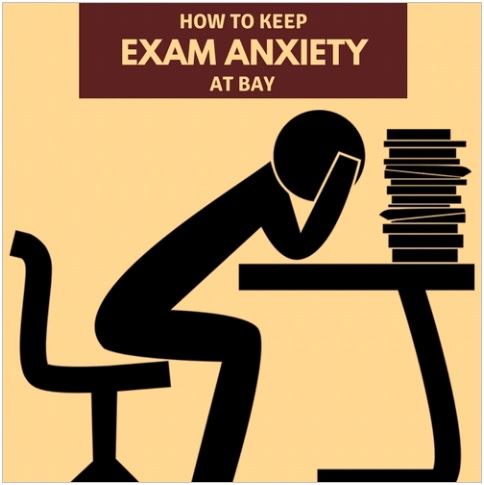
It’s a universal fact that exams are stressful. But are there any proper and systematic ways through which students can keep the stress at bay before the day of the examination? Maybe, the following list can help.

1. Maintaining a smart, methodical study routine and sticking to it at all possible cost
Maintaining an intelligent and systematic study routine can profusely contribute to a sound over-the-year preparation. This can also help to alleviate the level of stress at the time of your examination.
Here are a few well-ordered tips for your reference:
- Develop a clear, realistic and a well-defined goal, either on a short-term or long-term basis.
- Be determined of achieving the goal within a designated period of time.
- Practice smart and punctual study habits.
- Learn to manage time effectively during lessons.
- Prepare an organizational approach to solving problems.
- Review your past performances and learn from mistakes (if any).
2. Giving negativity a wide berth
Negativity can play a significant role in inculcating stress and anxiety in students. It’s, therefore, advisable to give it a wide berth, especially before the day of the examination.

Negativity, in many cases, has been found to be instigated by a batchmate, either intentionally or unintentionally. An example should clear this up:
Student A rings up student B for syllabus clarifications before the exam day. Student B informs A that “Chapter X” is indeed included in syllabus when, in reality, it isn’t. Student A gets stressed out as a result of such information because s/he didn’t prepare for it.
The discussion then continues further on negative exam achievements (like how many people failed last year), and student A gets more stressed out with each passing minute. Subsequently, his/her performance suffers when the situation calls for the most.
So you see negative discussions before the exam day can very well detriment your performance, on the whole. Better avoid for your own good.
3. Taking constructive study breaks between lessons
Studying for hours at a stretch is not advisable. It may pile up unnecessary pressure and stress that can hurt your performance, on the whole.
Research suggests that brief diversions (or breaks) between sessions can help to improve focus and reduce study overload for good. The following tips may come in handy for this purpose of yours:
- Take a short walk (say, 20 minutes at a stretch). It can help in improving your cognitive functions and memory.
- Take healthy snack breaks between studies. Crunchy veggies and fruits can do you a whole lot of good in the long run.
- A 30-minute power nap between sessions can be the key to an effective all-round preparation. This can help you stay focused and alert before the day of your examination.
- Involve yourself in a brief meditation session between lessons. This can significantly improve your focus and effectiveness in studies.
- Organize (or clean) your study space at the time of your break. A clean study space is a productive study space.
- Painting is a great stress buster. Do it during breaks to re-energize yourself for good.
4. Practicing breathing exercises during breaks to alleviate stress in the best possible manner
There’s a simple 4-7-8 yoga breathing exercise that you can practice during breaks to keep stress at bay in the best possible way.
Here’s how you can do it to perfection whenever you feel the stress getting the better of you:
- Place your tongue (only the tip would do) on the roof of your mouth, particularly behind your upper incisors.
- Breathe in deep to the count of 4.
- Hold your breath to the count of 7.
- Breathe out slowly with a whooshing sound to the count of 8.
- Repeat the entire procedure till you calm down. You will definitely see the results in no time.
5. Tactical management of exam time
If you fail to manage your exam time well, you won’t be able to attempt all questions no matter how you prepare for the same. These tips can help:
- Read the question paper as thoroughly as possible, particularly the directions. Take full advantage of your reading time for this purpose of yours.
- Carefully budget your exam time to each section accordingly.
- Stuck on a question? Skip it without any further thought. Come back to it later.
- Do the easier ones first. Remember, there’s no compulsion for you to attempt the paper in a serial order.

So that’s basically it. Hope the tips and tricks mentioned above come in handy for your exams. All the best!







